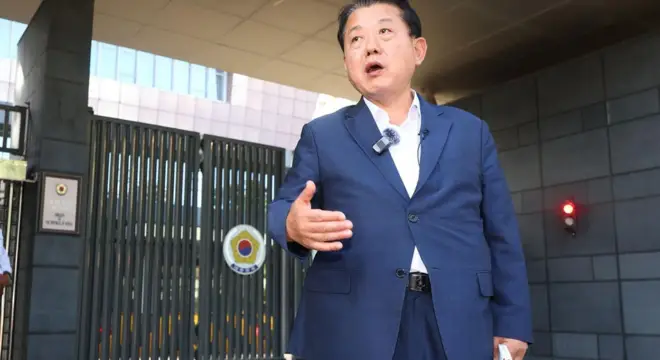In one of the largest anti-scam operations involving foreign nationals, more than 60 South Koreans detained in Cambodia’s notorious scam centers have been repatriated to Seoul — and immediately placed under arrest.
As per the South Korean government, a chartered flight of Korean Air carrying 64 citizens arrived at Incheon International Airport on October 18, 2025 and every individual was escorted off the plane with handcuffs and masks. Police stated that the detainees are suspects in an extensive online scam including romance scams, voice phishing and crypto investment scams.
Officials said arrests were executed onboard the aircraft, as under South Korean law, a national carrier’s plane is considered Korean territory, allowing police to enforce warrants midair.

The Rise of Cambodia’s Scam Industry
Cambodia has become a major hub for cybercrime syndicates, particularly since the COVID-19 pandemic, when many Chinese-owned casinos and hotels pivoted from gambling to illicit online operations.
Scammers at industrial-scale compounds run varied scams through digital frauds which include “pig-butchering” crypto schemes and romance scams aimed at victims in Asia, Europe, and North America.
Experts indicate there are about 200,000 people currently working in scam centers in Cambodia, with a minimum of 1,000 being South Korean nationals; some recruited through fake job ads, while others have been coerced or threatened to stay.
The evidence mirrors what has been seen in previous reports on the expanding crisis. As highlighted in South Koreans Trapped in Cambodia, many victims were misled by online postings promising high salaries but found themselves imprisoned and forced into cybercrime once they arrived.
Arrests on Arrival: Who Are the Returnees?
South Korea’s National Office of Investigation Chief, Park Sung-joo, said the returnees were part of ongoing voice phishing and crypto fraud networks in Cambodia. While some may have joined voluntarily, others were forced into participation.
National Security Adviser Wi Sung-lac confirmed that authorities would differentiate between victims and perpetrators during interrogation. “There are both voluntary and involuntary participants,” Wi said, “but most will face investigation for criminal acts.”
Upon landing, all returnees were sent to different police stations across Seoul, Incheon, and Busan for questioning. Each will also undergo drug testing, as Cambodian authorities suspect narcotics were used to control scam workers.
Outrage After Student’s Death
This mass repatriation comes after public outcry over the killing of a 22-year-old South Korean student who had allegedly been kidnapped, tortured, and killed by a Cambodian crime syndicate in August 2025.
The young man was found dead in a pickup truck abandoned in Kampot Province and had substantial bruising and trauma to his body. The matter stirred significant public outrage in South Korea, resulting in an official delegation from South Korea traveling to Phnom Penh.
The tragedy was earlier covered in detail in 22-Year-Old Korean Student Kidnapped, which shed light on how fake job offers and human trafficking have become intertwined in Cambodia’s scam network.
Following this incident, Seoul’s Foreign Ministry imposed a “Code Black” travel ban — the most severe level — for several parts of Cambodia, including Bokor Mountain in Kampot, where the student’s body was found. Citizens were ordered to leave the restricted areas immediately.
Seoul–Phnom Penh Cooperation: Cracking Down Together
The mass repatriation was the result of joint coordination between Cambodia’s Interior Ministry and South Korean officials.
Cambodian Interior Ministry spokesperson Touch Sokhak said the transfer reflected “good cooperation in the suppression of scams between the two countries.”
Cambodian Prime Minister Hun Manet also confirmed via social media that he met a South Korean delegation to discuss stronger collaboration on transnational cybercrime.
“Cambodia and the Republic of Korea will continue to strengthen cooperation to prevent and combat online scams more effectively,” Hun Manet wrote.
The Prince Group and Global Crackdown
The latest operation coincided with a sweeping international crackdown led by the United States and United Kingdom on the Cambodia-based Prince Group, a conglomerate accused of operating a multinational scam network.
The UK seized 19 London properties worth over $134 million, linked to the group, while U.S. prosecutors charged Prince Group chairman Chen Zhi with wire fraud and money laundering.
At its peak, Chen allegedly boasted that his networks were earning $30 million a day.
According to Koreans Kidnapped in Cambodia, these groups have strong connections to elite Cambodian levels and this is what makes it challenging for law enforcement and authorities to completely destroy their operations.
Rights Groups: “A Mass-Scale Human Trafficking Crisis”
Rights groups like Amnesty International have warned that Cambodia’s scam centers are sites of widespread human rights abuses, including forced labor, torture, and unlawful confinement.
At least 53 scam compounds have been identified, where victims from multiple countries — including Korea, China, Thailand, and the Philippines — are beaten, starved, and forced to work under inhumane conditions.
According to the UN, together they generate billions of dollars each year for organized crime syndicates.
Repatriation and Moving Forward
As the 64 Korean nationals are being debriefed, South Korean officials face the challenge of differentiating between victims of trafficking and those willing to participate in the scams.
Officials have committed to increasing digital literacy programs and improving screening systems for overseas jobs in order to avoid future atrocious situations like this.
Meanwhile, South Korea continues to urge Cambodia for tougher on-ground enforcement and swift prosecution of masterminds behind these centers.
This event brought to light once more how Southeast Asia’s scam industry – growing at a fast pace – has transformed into a type of modern slavery which takes advantage of both economic need and anonymity online.
Conclusion: A Wake-Up Call for Korea’s Youth
The recent rescue and arrests highlight an alarming trend: thousands of young people from across Asia are being caught up between false promises and criminal coercion.
What was initially an effort to find a better opportunity has become a nightmare of exploitation and fear.
The South Korean ban on travel to high-risk areas in Cambodia, and initiating cross-border Victorian investigations, is an important first step, but the battle against this shadow economy is not over.
Until more cooperative international awareness and cooperation is established, the story of citizens of the Republic of Korea trapped in the web of scams in Cambodia, will serve as a harrowing and catalysit warning to many looking for better opportunities abroad.


